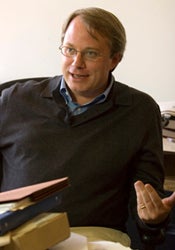In a recent edition of The New Republic’s online review ‘The Book,’ Harvard Law School Professor Adrian Vermeule ’93 reviews David M. Dorsen’s “Henry Friendly, Greatest Judge of His Era” (Belknap Press 2012)—a “clarifying biography” in which the author thoroughly examines Friendly’s judgments, arguments, and extrajudicial writings “with an eye to pinning down Friendly’s legacy.”
According to Vermeule, “The common feature of Friendly’s writings and judgments is their resolutely local character, and hence their lack of broader, generative implications. Whatever they are about is what they are about: they do not spark new ideas or new ways of looking at other settings.”
“Seen in its best light, Friendly’s contribution was not to enrich the theory of the law but to provide a living model of lawyerly craft and good judgment … the so-called Legal Process approach to judging,” he writes.
“Whatever the merits or demerits of the Legal Process approach, the reputations of judges such as Friendly generally have a shorter half-life than the reputations of judges who offer fertile theoretical ideas that can be distilled into formulas, theorems, and pithy aphorisms. … [I]t is just the unalterable nature of things that craft and tacit knowledge are harder for future generations to understand and appreciate than theoretically grounded knowledge.”
Vermeule’s latest book is “The System of the Constitution” (Oxford University Press, November 2011) in which he explores how individuals and larger institutions together shape the constitutional order. He is also the author, with Eric A. Posner ’91, of “The Executive Unbound: After the Madisonian Republic” (Oxford University Press, February 2011). A scholar of administrative law and constitutional law and theory, Vermeule has taught at Harvard Law since 2005, and was appointed John H. Watson, Jr. professor of law in 2008.
Local Wisdom
by Adrian Vermeule
Henry Friendly was a judge on the Second Circuit Court of Appeals, sitting in New York, and before that a highly regarded corporate lawyer. He ascended (if that is the right word) to the bench in 1959, and died in 1986. There is a puzzle about Friendly, a puzzle that David Dorsen’s clarifying biography poses in an acute form. By all accounts Friendly had a brilliant mind, and no judge in recent memory has had such an all-star cast of hagiographers and celebrants. Friendly’s former law clerks include some of the most prominent legal academics of their generation; and along with judges such as Richard Posner and Michael Boudin—the latter a Friendly clerk as well—they laud Friendly in terms not heard since Confucius’s disciples described their master as the eternal sage and uncrowned king. The puzzle is that it is actually a bit difficult to say what Friendly stood for, or what ideas of general and lasting significance he contributed to law and legal theory. … Read the full review on TNR.com »
